What to do if the gum near the tooth is swollen
According to statistics, visits to the dentist due to problems with the gums are not less than with toothache. Soft tissue swelling near the tooth is a clear sign of an inflammatory process. To select a treatment technique and decide what to do if the gum is swollen around the tooth, first of all, it is necessary to identify the cause of the edema.
Content
Causes and symptoms of periodontitis
Inflammation of the periodontium, the tissue that holds the tooth, often leads to gum swelling. This condition can be caused by the following reasons:
- Penetration of infection into the bone tissue through the dental canal. This usually happens if caries is not treated.
- Transition of inflammation from other organs. This is possible with diseases of the throat or sinusitis.
- Damage to the periodontal as a result of a sharp physical impact, such as a blow to or near a tooth.
- Contact with irritants in periodontium. This is possible with improper or unqualified dental treatment.
- Immunological reaction, as a result of an allergy. Quite a rare occurrence.
Symptoms of periodontitis:
-
there is a swelling on the gum in the area of the problem tooth;
- pain is felt when pressing on the tooth or next to it;
- temperature rises;
- the tooth does not react painfully to sweets, as well as cold or hot water;
- the gum swells until a whitish fistula appears with its subsequent breakthrough and outflow of pus.
Not all symptoms of this disease can occur simultaneously. The decline in gum edema due to breakthrough of pus is not a reason to ignore going to the doctor. Bone tissue inflammation is a very dangerous process., which must be cured, otherwise it will cause serious complications.
The permanent course of the disease leads to constant intoxication of the body and can serve as a catalyst for diseases of internal organs.
Manifestation of acute gingivitis
If the gum is swollen, but the tooth does not hurt, then the patient develops gingivitis or periodontitis. These processes are characterized by inflammation of only the tissue around the tooth. Periodontitis usually has a chronic course with periodic exacerbations, and gingivitis often proceeds in an acute form. The causes of exacerbation of pathologies and subsequent swelling of the gums are as follows:
-
systemic inflammatory diseases of internal organs;
- colds;
- diabetes;
- decreased immunity as a result of illness or taking drugs such as corticosteroids;
- hit of foreign bodies;
- the presence of tartar;
- soft tissue injuries, cuts and punctures.
Pain can be present both near a certain group of teeth, and throughout the jaw. Other symptoms of these diseases are:
- gums swell, acquiring a bright red color with a bluish tinge;
- the problem area hurts a lot with any pressure;
- there is swelling around the tooth with its partial closure;
- gums bleed at the slightest pressure.
With periodontitis, there are changes in the bone tissue visible on the x-ray: the interdental septa become lower.Exposure of the root of the tooth is also possible.
With such diseases, symptomatic treatment of gum disease will not lead to recovery. To resolve the problem, comprehensive measures are required under the guidance of an experienced dentist. In advanced cases, it can reach the formation of an abscess.
Periodontal abscess
Sometimes when examining the problem area, it is clear that the gum is not swollen completely, but there is a semicircular formation, often pale in color. By comparing the type of tumor with a classic photo of an abscess, you can easily identify it.
The causes of the abscess are many, but usually this occurs with periodontitis, when pus cannot penetrate the area of inflammation for a long time. Local inflammation can also be caused by a festering deep wound on the inside or outside of the gums.
Such a diagnosis as an abscess is made with the following symptoms:
-
there is a characteristic semicircular formation with an elastic stressed surface;
- red swelling of the surrounding soft tissues;
- when pressed, fluid movement inside the inflammation zone is felt - a symptom of fluctuations;
- the cheek was swollen, and the sky was swollen;
- temperature increase is possible.
Treatment of an abscess is carried out by opening an abscess and the appointment of a number of painkillers and anti-inflammatory drugs. The procedure itself is not too complicated and painful (taking into account anesthesia), but it is impossible to carry out it yourself at home. This is due to the need for high-quality disinfection of the resulting wound. Also, the doctor must determine the cause of pus accumulation and, if periodontitis or periodontitis is detected, conduct its treatment.
In the case of delaying treatment or after its unqualified conduct (independently in unsanitary conditions), complications may develop. The formation of phlegmon as a result of a breakthrough of pus under the skin or in the intramuscular space will lead to the need for serious surgery, including the removal of pus through the incisions of the face from the outside.
Other causes of inflammation
In most cases, prolonged swelling is caused by the above factors, but there are other reasons why the gums can swell. The easiest way to identify dental conditions for the appearance of a problem:
- Stomatitis. In advanced cases, before the appearance of ulcers, a swelling appears.
- Teething wisdom in adults and molars in children. A gum tumor forms over the tooth.
- Incorrect installation of fillings, veneers or braces. A constant effect on the tissue quickly causes it to swell at the site of irritation.
- Physical injury in the form of a puncture or cut. Inflammation of the wound may not begin immediately, but at that moment when the patient may no longer remember its existence.
- If the gum near the tooth swollen after its treatment, then this may be due to physical damage or an allergic reaction to medications or an anesthetic injection.
It is much more difficult to determine the reasons why the gums swell, if they are not directly related to dental problems. Mouth inflammation here is only an indicator of a serious problem in the body. Diseases such as AIDS, hepatitis and diabetes mellitus reduce the body's immune response to bacteria, which causes inflammation with the slightest damage to the tissues.
The cause of a gum tumor can be a herpes virus. With an atypical course of angina, the infection can also spread to the gum tissue and cause it to swell.
A serious vitamin C deficiency can also cause swelling. Although it is now difficult to imagine the development of vitamin deficiency to such an extent, given the presence in the free sale of fruits, vegetables and multivitamins.
When to see a doctor
If the gum is swollen and a little painful, then it is not necessary to immediately consult a doctor. This is especially true in cases where the cause can be uniquely determined independently. If the gum swells slightly in the first 3 days after treatment or tooth extraction, then this is a normal reaction organism. The same applies if the gum is swollen and sore at the site of the teething wisdom tooth.
There is no urgent need to treat the gum if its area is inflated as a result of injury by a toothpick, fish bone or other sharp object. But all this refers to “clean” wounds without manifestation of complications.
Urgently seek medical help is necessary in such situations:
 There was a smell from the mouth, there are taste sensations characteristic of purulent discharge.
There was a smell from the mouth, there are taste sensations characteristic of purulent discharge.- The gum is so swollen that there are problems with eating, or the cheek is apparently swollen.
- With a rush of blood as a result of tilting the head, feelings of heaviness arise.
- The gums swelled slightly, but this condition lasts longer than three days. It is better not to wait for suppuration.
- The color of the tumor differs from the color of healthy tissues located near the swelling. Burgundy and cyanotic color indicates blood stasis, yellowish and whitish - purulent process.
- The temperature has risen.
- It is not possible to relieve pain, or it has a pulsating character.
- It is not possible to establish the reason why the gum is swollen or the cheek is swollen.
If the gum is swollen, then for treatment it is necessary to contact dentistry. If the causes of swelling are not related to diseases of the oral cavity, then symptomatic treatment will be prescribed to relieve pain and prevent the development of complications, and the therapist will determine the etiology of the disease.
Drug treatment
First of all, it is necessary to eliminate the cause of inflammation. Depending on the type of problem, the dentist may perform dental treatment, an autopsy, or other surgical procedures in the oral cavity. He will also prescribe medication using antiseptic and anti-inflammatory drugs.
An antiseptic fights against pathogens that lead to inflammation. Since the gums swell as a result of exposure to various bacteria and germs, only a qualified specialist can prescribe an effective drug.
Self-treatment with antiseptics is not recommended, you can make a mistake. Choosing the right remedy is difficult due to the existence of restrictions on the combined use of certain drugs. This is especially true for antibiotics.
Anti-inflammatory drugs quickly remove puffiness, which helps to get rid of pain and improve the general condition of a person. These drugs are referred to as symptomatic treatment, so you can choose them yourself. The only condition is the absence of an allergic reaction to the components of the drug.
Since the local area is subject to inflammation, ointments are usually used to remove it. They are applied around the tooth, where the gum swells 3 times a day after meals.
Home treatment
Using traditional medicine together with drug treatment, it is possible to quickly relieve swelling at the site of inflammation, get rid of severe pain and it is better to perform antibacterial and antimicrobial treatment of the oral cavity. If the gum is swollen, then at home, treatment is carried out in the following ways:
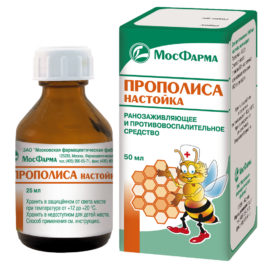 Rinse with decoctions of herbs. Usually use calendula, sage, lemon balm, St. John's wort, chamomile. The main contraindication is allergic reactions to specific herbs. The purpose of the procedure is to disinfect the gum lesion area.
Rinse with decoctions of herbs. Usually use calendula, sage, lemon balm, St. John's wort, chamomile. The main contraindication is allergic reactions to specific herbs. The purpose of the procedure is to disinfect the gum lesion area.- Rinse the mouth with diluted propolis tincture. This treatment method has a complex therapeutic effect in the presence of accompanying diseases of the ENT organs, such as sinusitis or tonsillitis.
- Rubbing honey into the gums around the tumor with a soft brush. This relieves pain, softens the tissue and prevents the formation of scabs.
- Lubricate gums with vegetable oils using a soft brush or bandage. Apply olive and fir oil.Effective for gum disease over a wisdom tooth.
If the gum is swollen, then you can rinse your mouth with a solution of salt and soda. To prepare it, dissolve one teaspoon of each component in a standard glass of water. Rinse the mouth after eating. The tool gives a good effect if necessary to heal wounds and stop bleeding.
It is strictly forbidden to warm the gum, and when it is slightly swollen, and when it is heavily pouted. This reduces the level of pain, but contributes to the intensive reproduction of pathogens.
The use of irrigator in the fight against swollen gums
To reduce puffiness, the use of an irrigator is effective. This device is gradually becoming part of the user's life despite the fact that it was created back in 1962.
The irrigator delivers water at high pressure, which allows not only to clean hard-to-reach tooth surfaces, but also to influence soft tissues. This device was originally designed to clean the interdental spaces. But, in parallel, by massaging the gums with a stream of water, it is possible to restore blood circulation in the affected area. This will facilitate rapid regeneration.
Indications and contraindications for use
An irrigator is shown for almost every person, it is the same hygiene product as toothbrushes and pastes. The device is in addition to basic oral care. For people with gingivitis and periodontitis, irrigators are the best choice, especially if pain is present and using a toothbrush becomes impossible.
Among the contraindications, doctors distinguish:
- Acute forms and exacerbations of chronic forms of gingivitis and periodontitis.
- Conditions after surgery on the tissues of the oral cavity. Irrigation with water prevents the formation of a blood clot, respectively, wound healing is very slow.
How to use an irrigator for a gum tumor
Before use, it is necessary to clean the oral cavity with a toothbrush and toothpaste. Fill the tank with filtered water only. Then proceed with irrigation cleaning.
The device must be held at a right angle. Starting with the least pressure, treat the gums near each tooth, it is better to start with the teeth of the upper jaw. The total procedure time should not exceed 10-15 minutes.
If bleeding occurs after using the irrigator, consult your dentist to help you choose the regimen that suits you.
Which irrigator is best for getting rid of a tumor in the gum
For those who are just thinking about acquiring, it is worth paying attention to the irrigators of the German brand ACleon. The manufactured devices are quite simple to use, so they are convenient to use even for beginners. Reasonable price makes them available to absolutely everyone. In addition, German quality guarantees a long service life of irrigators.
The company produces two types of irrigators:
- Stationary (ACleon TF600);
- Portable (ACleon TF200).
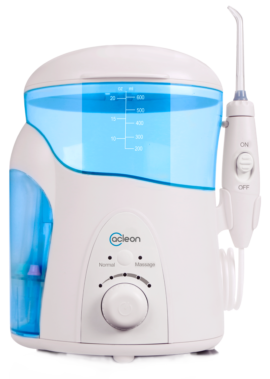 Stationary irrigators This brand has several advantages:
Stationary irrigators This brand has several advantages:
- They have a built-in ultraviolet lamp, which is designed to disinfect nozzles.
- Each area has its own specific nozzle. They are in the set of 7 pieces.
- 17 modes allow you to choose the optimal pressure of the jet.
- The water tank has a capacity of as much as 600 ml.
This type of device is convenient to have at home, because it works from the network.
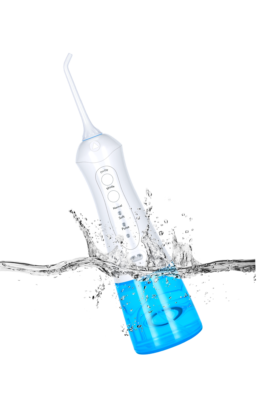 Portable irrigators in turn, attracted by the fact that:
Portable irrigators in turn, attracted by the fact that:
- They take up little space, it is convenient to take them with you. Their weight is only 250 grams. The manufacturer took care of the buyer and also included a cover in the kit.
- Compared to other portable devices, this one has a capacity of up to 750 kPa!
- Work occurs without connecting to a network. The battery lasts a long time.
- The water tank has a capacity of 200 ml.
Gum Disease Prevention
Prevention can prevent many serious problems in the oral cavity.Key Recommended Activities:
- Brush your teeth regularly. If there is no brush, you can use dental floss or rinse your mouth with salted water.
- Regularly conduct a routine examination at the dentist. You also need to immediately treat bad teeth and seek medical help if you suspect other serious problems.
- Try not to injure your gums with hard foods or sharp objects. It is better not to use hard candies, crackers, unpeeled seeds, and it is strictly forbidden to use your teeth to open corks, bite fine wire, hold nails and other similar actions.
- Gum massage. This can be done with a soft brush or with chewing gum. You can also chew honeycomb.
- Maintain a good diet with the use of calcium-containing foods. This element is found in high concentration in dairy products, beans, meat and eggs.
- Stop smoking.
It’s easy to follow these recommendations. The benefits of them extend not only to the oral cavity, but also to the entire body. If the gum is swollen, or the cheek is swollen, then poisoning of the body due to intoxication often occurs. Therefore, it is better to take measures to prevent this problem.
There are a lot of causes of gum swelling, and the treatment technique depends on the factors that led to this phenomenon. If the case is not entirely obvious, then only a doctor can correctly diagnose, perform the necessary procedures and prescribe drugs. Seek professional help in a timely manner, in order to avoid the development of complications.

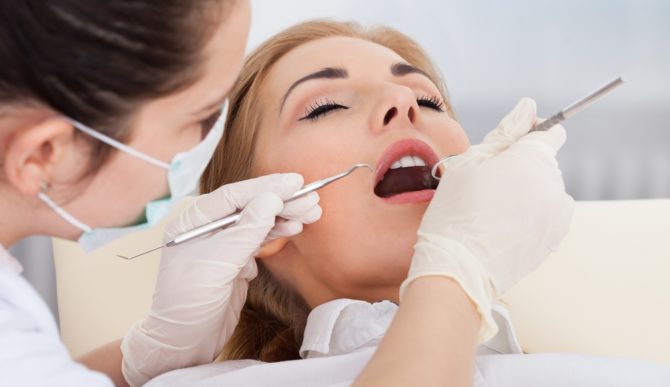
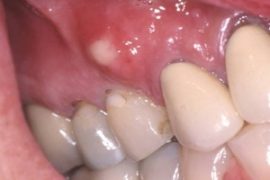
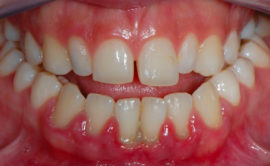
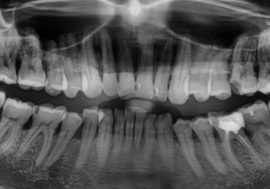
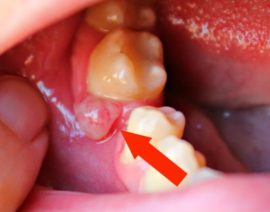



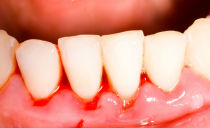
I also have an irrigator and there are no problems with gums and teeth. Previously, gums often inflamed and bleed too, now everything is ok.
I believe that if the gum or cheek is swollen, first go to the doctor, do not self-medicate.
The main thing is prevention. You need to brush your teeth, use floss and an irrigator if desired. I do this and do not know the problems.
I, as soon as there are signs of gum inflammation, I immediately begin to add special fluids to the irrigator. The irrigator rinses everything well, and the inflammation disappears in a few days.
I somehow had no special problems with the teeth, there were a few curves, I installed braces. To avoid problems, I immediately bought an Irrigator Akleon TF 600 for myself. The doctor warned that the gums could become inflamed, 3 months have passed while there are no problems.
And because of tartar, my gums periodically become inflamed, I have to go for cleaning. We must try the irrigator, maybe my salvation will be 🙂
It will definitely help. I had the same problem, the gums become inflamed at the first symptoms of a cold, the irrigator (I have Acleon TF 600) was my salvation.
Often I get colds, hence the constantly swollen gums 🙁
I bought an irrigator, I hope it helps.